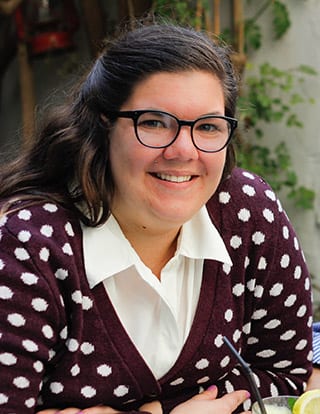By Andrew Cohen

For the second straight year, Berkeley Law landed more Equal Justice Works (EJW) fellowships than any other law school. The coveted two-year fellowship supports exceptional lawyers who develop new, innovative projects that provide legal services to low-income and underserved populations.
Susan Beaty ’18, Margaret Burgess ’15, Tori Porell ’18, Lydia Sinkus ’17, and Peter Weiss ’18 are among this year’s 67 fellows. They will receive a competitive salary, generous loan repayment assistance, and connections to their prominent private sponsors while participating in trainings and other programs.
“I’m not surprised,” Porell says of Berkeley Law’s EJW success. “The chance to do substantive client work right away as a 1L (through the Student-Initiated Legal Services Program) is so formative for many students here. The earlier law students can get out there … the earlier they become better advocates and more inspired to do public interest work.”
Porell will work at the East Bay Children’s Law Offices in Oakland. Sponsored by the Morrison & Foerster Foundation, she will provide early intervention representation for Alameda County foster youth up to age 5 in special education, school discipline, and developmental services.
Berkeley Law’s Career Development Office introduces students to fellowship opportunities in their first year. As 2Ls, they receive assistance with the application process and strategize with staff about possible organizations, interest areas, and networking. The CDO also pairs applicants with past fellows who provide informed feedback, and offers mock interviews.
Issue spotting
As a former teacher and leader of Berkeley Law’s Foster Education Project, Porell knows the hurdles facing foster youth. More than 75 percent perform below grade level, 83 percent are held back by the third grade, and 46 percent do not complete high school.
In addition to representing clients, Porell will prepare an internal protocol for her employer to proactively aid foster families. She will also work with the Social Services Agency on developmental and early education screenings—and the reporting of results to the juvenile court.
“With most kids, it’s noticed if they’re not talking or walking on time, or having trouble socializing,” Porell says. “But when a kid bounces from home to home, there’s no baseline to know what’s normal for that kid. That’s why early screenings are so important.”
While helping a boy who was being expelled from preschool, Porell began seeing a disturbing trend of young kids facing exclusionary discipline.
“It’s the exact opposite of what needs to happen at that age,” she says. “Instead of identifying and addressing the underlying problem, this sets kids on a bad path. When you’re being pushed out of school at a young age you think ‘Okay, I’m a bad kid, I don’t belong at school.’ That’s a harmful message and exacerbates our school-to-prison pipeline for children of color.”
Star-studded fellowship cast
Here is a look at Berkeley Law’s other EJW fellows:
Beaty, sponsored by Fenwick & West and California ChangeLawyers, will work for Centro Legal de la Raza in Oakland. She will create the nation’s first legal outreach program in an Institutional Hearing Program facility (where just 9 percent of incarcerated immigrants have attorneys) and consult with incarcerated immigrants facing deportation in two federal prisons. Beaty, who co-led the Berkeley Immigration Group in law school, has represented dozens of people in detention, prison, and removal proceedings.
Burgess, sponsored by Cox Enterprise and Eversheds Sutherland (U.S.) LLP, will work for the Atlanta Legal Aid Society. She will represent low-income victims of housing discrimination, focusing on the exclusion of applicants with any arrest record or criminal history and the refusal to accommodate renters with disabilities. Burgess, who helped housing discrimination victims as a law student and at a plaintiffs’-side firm, will train colleagues to spot fair housing claims during client intake.
Sinkus, sponsored by PayPal and Orrick, Herrington & Sutcliffe LLP, will work for OneJustice in San Francisco. She will expand clean-slate services for immigrants in rural and isolated parts of Northern California. Sinkus has vast experience connecting the rural community with urban sector resources, and providing legal services to immigrant populations. She will recruit pro bono lawyers, ascertain potential clinic locations, and identify post-conviction relief cases that warrant representation.
Weiss, sponsored by Hewlett Packard Enterprise and the City of San Jose, will work for Pangea Legal Services in Milpitas. He will assist immigrants with past criminal convictions through direct representation in immigration court, legislative advocacy, and partnership with the Santa Clara County Public Defender. Weiss, who co-led the Berkeley Immigration Group and the California Asylum Representation Clinic in law school, will also partner with a local organization on strategies to keep immigrant families together.
Other recent fellowship recipients include Skadden Fellow Shane Crary-Ross ’18 (California Rural Legal Assistance), who will create a medical-legal partnership to address economic and housing insecurity and their impact on impoverished people in western Sonoma County; Pride Law Fund Tom Steel Fellow Ari Jones ’18, who will work to help queer immigrants gain lawful permanent status and to increase their access to housing, employment, and public benefits; and Justice Catalyst Fellow David Nahmias ’18 (Impact Fund), who will help low-wage LGBTQ workers in California through impact litigation, trainings, direct services, and policy advocacy.